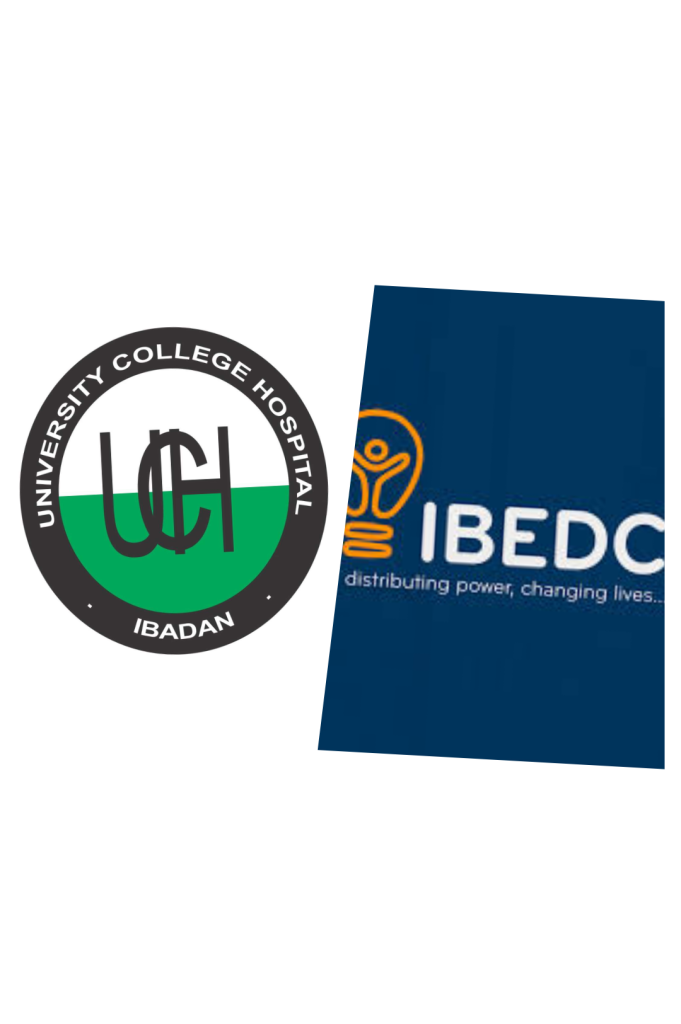
Ibadan Electricity Distribution Company (IBEDC) has cut off the electricity supply to the University College Hospital (UCH), Ibadan, due to an alleged backlog of unpaid utility bills.
In a statement made availabe to journalists by University College Hospital Public Relations Officer, ’Funmi Adetuyibi, the management wishes to inform the patients of the hospital and general public that there have been power challenges in the Hospital. We understand the concerns and inconveniences these have caused.
The situation arose from the disconnection of power by the Ibadan Electricity Distribution Company (IBEDC) on 26th October, 2024.
However, the Hospital Management has held several meetings with the management of Ibadan Electricity Distribution Company (IBEDC) on payment modules.
The Hospital bills from IBEDC inclusive of accumulated bill since 2019 to date is Three Billion, One Hundred and Four Million, Five Hundred and Sixty-Eight Thousand, One Hundred and Fourteen Naira, Sixty-One Kobo (N3,104,568,114.61).
To date the hospital has paid Two Billion, Nine Hundred and Sixteen Million, Five Hundred and Sixty-Seven Thousand, Seven Hundred and Twenty-Four Naira, Twenty-Seven Kobo (N2,916,567,724.27) and left with an outstanding bill of Three Hundred and Ninety-Two Million, Seventy-Five Thousand, One Hundred and Sixty-One Naira, Five Kobo (N392,075,161.05).
This power disconnection has resulted in our inability to effectively meet our Hospital’s mandate (Clinical Service, Research and Training) to our esteemed patients.
As a result of this, we sincerely identify with our patients and their relations at this period.
In a bid to mitigate the effects of this hardship, the Management has taken some steps which includes the following:
Dissemination of Information to Patients: The Management continues to engage all heads of departments of both clinical and non-clinical and all stakeholders to communicate to the patients and their relations on the situation of power and the steps Management is taking for alternative sources of power.
Alternative Power Sources:
Backup generators to power critical areas, including: Emergency department, operating theatres, Intensive Care Unit, and Laboratories, among others.
Solar/inverter panel has been made available in the following areas of the hospital: Emergency Department, Main Theatre, Intensive Care Unit, Paediatrics Intensive Care Unit, East 3 Ward, South East 3, Owena Dialysis Ward, High Dependency Unit, South West 2, all the clinics: General Out-patient Clinic to Medical Out-patient Clinic, Kidney dialysis, Endoscopy, Echocardiography/Electrocardiography Suites.
Provision of Mini solar bulbs have been made available to illuminate critical areas e.g. Otunba Tuwase Paediatrics Ward in the first instance.
Contingency Planning: We have developed emergency response plans to ensure seamless continuity of patient care during outages.
We prioritize patient care and safety above all. Our dedicated staff are working tirelessly to ensure minimal disruption to services. We assure you that:
Emergency services remain operational.
Creation of situation room to providing real time solutions.
Critical areas are receiving power supply.
Water is pumped whenever power is available
Patient care and treatment continue uninterrupted in critical areas.
Efforts are at an advanced stage on alternative energy provision.
Once again, the Management sincerely expresses deep concerns for the inconveniences being experienced during this power outage. Though, there may be delay in service delivery, concerted effort is made to speedily resolve the problem.
We want to assure the general public that the UCH is committed to serving them adequately and effectively.
According to reports, the outstanding payments have accumulated over time, with IBEDC citing financial constraints on its end as the reason for the decision.
The development has triggered widespread concerns about the impact on patient care and hospital operations, as UCH is one of Nigeria’s leading teaching hospitals, serving thousands of patients and providing critical care services.
Health practitioners and hospital staff have voiced worries over the potential risks to patient care, especially for those relying on electricity-dependent medical equipment such as ventilators, dialysis machines, and surgical tools. UCH management has reportedly resorted to backup generators to sustain essential services, but there are fears this solution may not be sustainable due to the high cost of diesel and maintenance.
The management of UCH stated that the hospital’s budget is insufficient to cover rising electricity costs alongside other operational expenses, calling for government intervention. “We cannot compromise patient care, but our resources are limited. This situation calls for urgent support from both federal and state governments to prevent any service disruptions,” a UCH official commented.
In response, IBEDC stated it understands the critical nature of the hospital’s services but added that it has tried to work with UCH on payment plans in the past. “We must also meet our financial obligations to provide consistent service to our entire customer base,” an IBEDC spokesperson said. The company has proposed a structured repayment plan to the hospital in an effort to restore power.
Many stakeholders, including patient advocacy groups and the Nigerian Medical Association, have urged the federal government to mediate between the two institutions to ensure an uninterrupted power supply for UCH.
They emphasize that power disruptions could jeopardize lives and disrupt essential healthcare services, highlighting the broader challenges facing Nigeria’s healthcare infrastructure.
